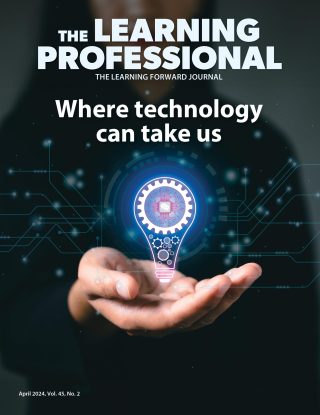FEATURE ARTICLE
Boomers and Millennials — Vive La Différence
How to Mesh Generational Styles in a Learning Community
By Learning Forward
October 2012
Vol. 33 No. 5
Read the remaining content with membership access. Join or log in below to continue.
Sed ut perspiciatis unde omnis iste natus error sit voluptatem accusantium doloremque laudantium, totam rem aperiam, eaque ipsa quae ab illo inventore veritatis et quasi architecto beatae vitae dicta sunt explicabo. Nemo enim ipsam voluptatem quia voluptas sit aspernatur aut odit aut fugit, sed quia consequuntur magni dolores eos qui ratione voluptatem sequi nesciunt. Neque porro quisquam est, qui dolorem ipsum quia dolor sit amet, consectetur, adipisci velit, sed quia non numquam eius modi tempora incidunt ut labore et dolore magnam aliquam quaerat voluptatem.
The Millennial Teacher
- Expects to work with peers.
- Puts personal loyalties ahead of professional.
- Embraces change.
- Open to individual rewards.
- Adapts to shrinking job prospects.
- Not afraid to question authority.
The Boomer Teacher
- Values working independently.
- Puts professional ahead of personal.
- Resists change.
- Seeks equality in pay and protections.
- Laments shrinking job prospects.
- More deferent to authority.
References
Coggshall, J., Ott, A., Behrstock, E., & Lasagna, M. (2010). Retaining teacher talent: The view from Gen Y. Naperville, IL: Learning Point Associates & Public Agenda.
Corsten, M. (1999). The time of generation. Time & Society, 8(2-3), 249-272.
Hargreaves, A. (2005). Educational change takes ages. Teaching & Teacher Education, 21(8), 967-983.
Hess, N. & Jepsen, D. (2009). Career stage and generational differences in psychological contracts. Career Development International, 14(3), 261-283.
Howe, N. & Strauss, W. (2008). Millennials & K-12 schools: Educational strategies for a new generation. Great Falls, VA: LifeCourse Associates.
Johnson, S. (2004). Finders and keepers: Helping new teachers survive and thrive in our schools. San Francisco, CA: Jossey-Bass.
Kupperschmidt, B. (2000). Multigeneration employees: Strategies for effective management. The Health Care Manager, 19(1), 65-76.
Little, J. (1982). Norms of collegiality and experimentation: Workplace conditions of school success. American Educational Research Journal, 19(3), 325-340.
Lovely, S. & Buffum, A. (2007). Generations at school: Building an age-friendly learning community. Thousand Oaks, CA: Corwin Press.
Nieto, S. (2001). What keeps teachers going? And other thoughts on the future of public education. Equity & Excellence in Education, 34(1), 6-15.
Pajares, M. (1992). Teachers’ beliefs and educational research: Cleaning up a messy construct. Review of Educational Research, 62(3), 307-332.
Peske, H., Liu, E., Johnson, S., Kauffman, D., & Kardos, S. (2001). The next generation of teachers: Changing conceptions of a career in teaching. Phi Delta Kappan, 83(4), 304-311.
Learning Forward is the only professional association devoted exclusively to those who work in educator professional development. We help our members plan, implement, and measure high-quality professional learning so they can achieve success with their systems, schools, and students.
Recent Issues
EVALUATING PROFESSIONAL LEARNING
February 2024
How do you know your professional learning is working? This issue digs...
TAKING THE NEXT STEP
December 2023
Professional learning can open up new roles and challenges and help...
REACHING ALL LEARNERS
October 2023
Both special education and general education teachers need support to help...
THE TIME DILEMMA
August 2023
Prioritizing professional learning time is an investment in educators and...












